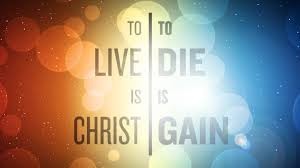I just finished leading a memorial service for someone—someone young. Death had not been expected. Life was the probability. But death came. It has been shattering for the family, as one would imagine.
Just a few hours before this I was meditating on Paul’s words to the Philippian believers, written from prison. His circumstances were reversed: death was a possibility, though he had optimism for a release from prison and continued earthly life and ministry. Nevertheless, his circumstances were frightening— more for his friends than for Paul himself. As he wrote he aimed to steady their nerves and reinforce their faith. So he began to speak of how he’d come to view life and death. He said, “For me, to life is Christ and to die is gain” (Philippians 1:21).
The basics are pretty obvious: Life = Jesus; Death = Gain.
But what does that mean . . . really? Let’s start with the first: Life = Jesus.
There is great economy in the Apostle’s words. Literally, says “to live, Christ.” Is Paul merely using artful expression or is he describing an existential reality? Is his brevity mistaken for more than he intends? Or has he taken off his sandals because he is walking on holy ground and measuring his words lest he misspeak?
The life of the indwelling Christ was a daily, moment-by-moment reality for Paul. He seems to have especially sensed this reality in times of extremity: “we are afflicted in every way, but not crushed; perplexed, but not despairing; persecuted, but not forsaken; struck down, but not destroyed; always carrying about in the body the dying of Jesus, so that the life of Jesus also may be manifested in our body. For we who live are constantly being delivered over to death for Jesus’ sake, so that the life of Jesus also may be manifested in our mortal flesh” (2 Cor. 4:8-11). The actual, fleshly, earthly engagement of life and all its realities is the arena wherein Jesus personally shows up with the manifestation of His life in and through His child. It is not merely an inward thought, feeling or attitude. It is that, but it is more than that. The life of Jesus is “manifested” in us and through us. It finds expression and evidences itself. Thus Paul can say, “to live is Christ.” He can confess in another place “it is no longer I who live, but Christ lives in me” (Gal. 2:20). He reminds the Colossian believers that it is “Christ, who is our life” (Col. 3:4). Jesus commanded His followers, “Abide in me, and I in you” (John 15:4a). This is mystery deep, but it is also life indeed.
The Lord Himself, by “the Spirit of Jesus Christ” (v.19), takes up residence in the believer. He Himself is the very eternal life He promised us. His life is my life. And moment-by-moment, circumstances-by-circumstance, thought-by-thought, conversation-by-conversation, relationship-by-relationship Jesus aims to manifest His life in me, to me, and through me. He intends that I live by His indwelling life.
This is the privilege and calling and hope of the believer. This has dramatic, transforming implications for our minds/thoughts/reasoning, our words/relationships/interactions, our service/ministry/witness, and our bodies/health/healing … for all of life!
And Paul, with equal brevity can say: “… to die is gain.” Death = gain. But honestly, that just doesn’t compute for most of us. And the only way it will is for us to first begin to live out the reality that “to live is Christ.” The one leads necessarily and supernaturally to the other. Until I have tasted of the life of Christ now as an abiding, sustaining, empowering, sanctifying, satisfying reality, I will never truly believe “to die is gain.” When I do, I will … for to die is to enter more immediately into the life and reality of Christ’s life.
To live = Jesus. To die = gain. They are not merely parallel statements; there is a causative relationship between them. First the life of Jesus manifested in me, to me, and through me in the details of daily life. As satisfying as that is (and it truly is!), once you’ve tasted of His indwelling life the notion of the unfiltered presence and life of Jesus as a manifested reality is too all consuming and the child of God begins to anticipate the release that physical death will bring … and they find themselves genuinely confessing: to die = gain.
Life = Jesus; Death = gain. Both are truly true. But they are only true in experience when we settle the first part: “For to me …”
How do I come to this place?
I’m afraid you won’t like the answer.
Ready? Here it is: disappointments.
Sorry, but it’s the only way.
When I realize that this life can never keep its promises, I will be ready to look elsewhere. Not merely to another day, but to another life. The life of eternity is available to me in time. The life of God manifested in my mortal body, mind, emotions, and will. When I decide that He alone, His life alone, is “For … me” then I am ready to experience the indwelling of His divine life.

Leave a Reply